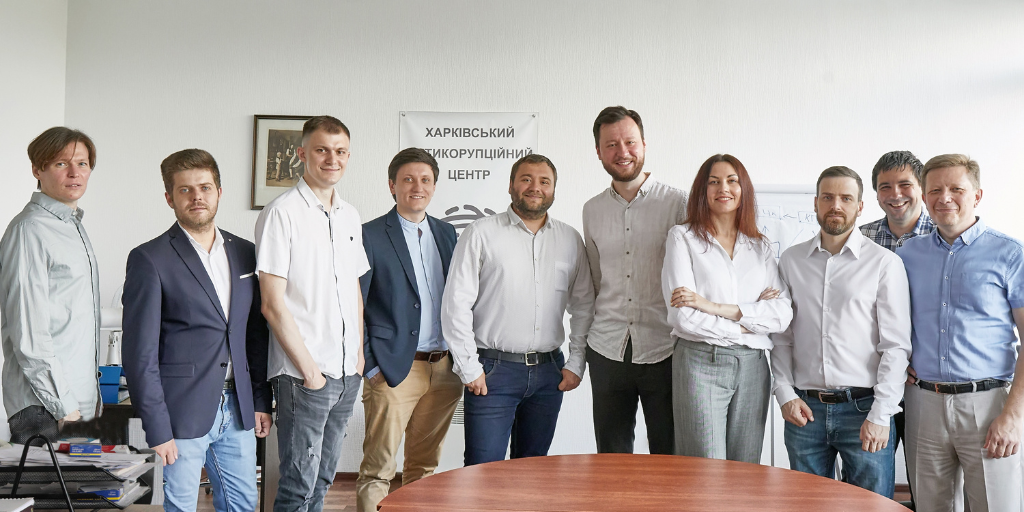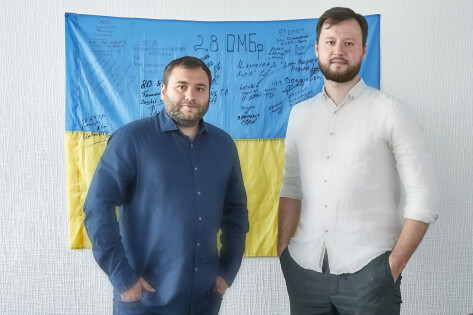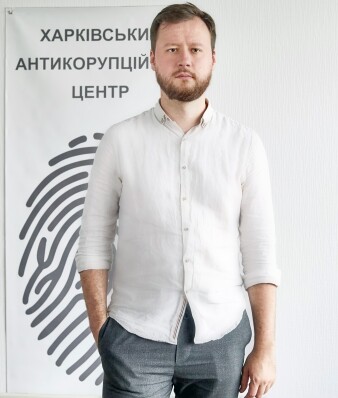
“Russia’s full-scale war against Ukraine has created a lot of challenges for Ukraine's democracy, but today it is our reality. We have to work with what we have,” says Dmytro Bulakh, chair of the board of management of the Kharkiv Anti-Corruption Centre.
An initiative aimed at strengthening transparency and openness of local authorities in Kharkiv, the Kharkiv Anti-Corruption Centre focuses on the analysis of public procurement tenders and other public documents. Over nearly ten years of its existence, it has been highly successful in this work, preventing corruption in land-sales and other schemes that misuse taxpayers’ money.
The challenges are multiple.
Kharkiv is only an hour from the Ukraine-Russia border and is under constant attack from Russian forces. Parts of the Kharkiv region were occupied in the early days of the full-scale war and were then liberated by Ukrainian forces in late 2022.
The Centre’s team work from across Ukraine. Dmytro himself is in active service with Ukraine’s Armed Forces. While he admits that the full-scale war has made anti-corruption work more difficult, he insists that the team has never stopped working.
“Democratic processes, openness, and transparency have shrunk due to the full-scale war,” Dmytro says. “But, we have though seen improvements in public procurement and government decision-making thanks to our work. That’s progress and we want more of it.”

The Centre was established in 2015, a year after the Revolution of Dignity, which had a profound impact on Ukrainian society and paved the way for more transparent and accountable policymaking in the country. Following the Revolution, Ukrainians elected a new, EU-oriented government, and advocated for more democratic reforms across the country.
“When we launched, we caused quite a sensation. Nobody had done this work before. We got a lot of positive feedback, and we still feel the support from our beneficiaries and from residents in and around Kharkiv,” says Dmytro.
“The support we received from the EED after we launched was crucial,” Dmytro says. “EED was our first donor, and it helped us start our initiative and work systematically in the longer run".
After the launch, the team started working with open data registries, sending information requests, and analysing insiders’ data to pin down any discrepancies in public spending or other decisions made by the city and regional authorities in Kharkiv.
“We managed to stop corrupt schemes for selling land, and other unlawful spending by the officials,” says Dmytro. “We won court cases that dealt with illegal constructions, and we were able to change the strategy toward openness of the local councils. Now we are pushing for more positive changes such as proposing alternative solutions which are implemented across the region and in the city of Kharkiv.”

The impact of nearly three years of war has meant that it is difficult for the Centre to plan. “We cannot predict what will happen tomorrow, and this changes everything,” says Dmytro.
Monitoring work is also more complicated. Early in the war, the Ukrainian government shut down its open data registries, and city councils and regional authorities became less transparent. Fewer datasets on public spending were published, and it was harder to demand the authorities to release information on procurement and other activities which involve public spending. This has had a significant impact on anti-corruption work.
“In addition to an external enemy that keeps on harming us, we also have the inner enemy of corruption. I have experienced pressure from the law enforcement authorities for my work,” he says.
However, he believes that the Centre’s reputation helped it confront this pressure. "We are able to continue with our monitoring work because we already made a name for ourselves as a credible and trustworthy organisation,” he says.
The Centre has also worked to identify collaborators and people who worked with the Russian army when parts of the Kharkiv region were under Russian occupation. The team has focused its efforts on fighting Kremlin-sponsored disinformation.
Other investigations have analysed the construction of fortifications in the Kharkiv region which remains a big issue due to the high vulnerability of the area, and ineffective spending of the taxpayers’ money which is harming the procurement for the army. As Dmytro points out, there were cases when army equipment was purchased for an inflated price. They were able to pinpoint these violations and bring the public’s attention to them.
While Dmytro recognises that corruption remains a serious issue today, he emphasises that this is often due to inefficiencies and a lack of relevant investigative skills from the law enforcement authorities.
He sees a lot of progress, particularly in the way the authorities are now sharing data and reporting their spending with citizens. This is a result of greater scrutiny from civil society and a changing culture of openness and transparency. Today, residents expect more accountability from officials. He believes the Centre’s work is having a real impact too.
“Public procurement has improved over the last six years. There are fewer unethical or corrupt practices, and this is thanks to our work. Many of these improvements were done in consultation with us, and we have the expertise to advise and continue helping the authorities whenever needed. For instance, with our support, the Kharkiv city council created a special unit for purchasing supplies for its offices using a transparent system.”
Kharkiv residents remain actively engaged in the Centre’s work, despite many now living elsewhere. “It is great to see how people are interested in their home region regardless of where they are now. People care about their home, and they want it to be more transparent,” he says.
This article reflects the views of the grantees featured and does not necessarily represent the official opinion of the EED.
This initiative was supported thanks to the contributions of the European Commission and of the Government of Canada to EED.